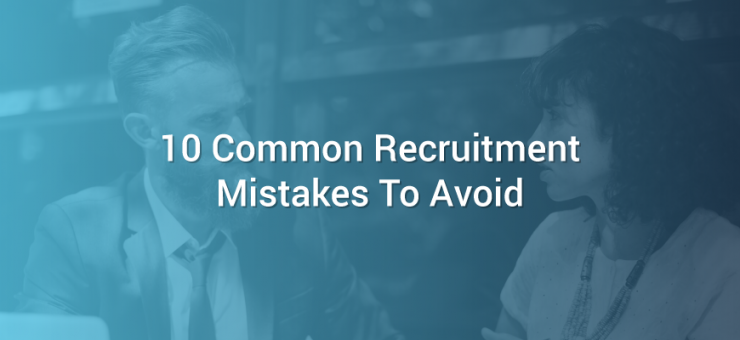There’s a lot of responsibility resting on HR managers’ shoulders as regulations and the size of the workforce keeps increasing. The expectations are growing and more complex while businesses try to do more with less. With that in mind, it’s no surprise that mistakes happen in HR management, so we’ve made a list of the top 10 most common recruitment mistakes in the hopes that awareness will lead to fewer of these mistakes.
1. Passing over an overqualified candidate
HR managers may be tempted to reject a candidate that seems overqualified because they want to avoid being overshadowed by them, or because they think the candidate will become bored in a lower position and leave the organization shortly after joining. However, these people have the potential to develop your team and improve it, regardless of how long they stay with the company. Also, consider proposing opportunities for development, promotions, or bonuses which may lead to employee retention.
2. Ending an interview early
Organizations have occasionally ended interviews early because they could tell the candidate wasn’t the right fit. This can backfire, however, as the individual can get upset, or the interview may turn around and recruiters can be surprised by what further questions would reveal. In any case, if your organization commonly ends interviews early, this should be clearly expressed to candidates in advance so there are no nasty surprises in the moment.
3. Going for tenure over talent
HR managers often make the mistake of going for tenure instead of talent. This will not only cause you to have a less than ideal employee in a new position, but you could lose young talent if they see there is no opportunity for career progression. Tenure and loyalty are both important, but if there’s a clear difference in talent this should be rewarded so your company can stay ahead and be more innovative.
4. Offering poor compensation
An HR analyst at WriteMyX and Brit Student, Susan Greer, says that “if your compensation package is below the market rate, you’ll likely lose good candidates. Do some market research and look at trusted sources to find fair compensation that will attract candidates.”
5. Waiting for the right candidates
If you have the image of the perfect candidate in your head, you may be passing up other qualified and excellent hires waiting for this potentially impossible candidate to come along. Your team’s morale will also be affected as they will not only be understaffed but feel undervalued if some have applied for promotion. If you don’t have the perfect candidate, look instead for someone who meets most of the requirements, has good soft skills, and would be a good fit in the company.
6. Putting too much weight on references
You shouldn’t put too much stock in references, good or bad. A positive experience elsewhere doesn’t mean it will be repeated at your organization, and a negative experience in another team doesn’t mean that candidate wouldn’t be a better fit on your team. Use references to confirm some of the details in their CV, but rely more on tests or exercises that will show how the candidate will do in your role.
7. Having too high expectations
It takes new hires some time to get integrated and start producing results. You need to give them time to learn the job and help them familiarize themselves with the goals and responsibilities. This on-boarding process has to continue throughout the first few months to ensure a well-integrated individual.
8. Not considering counter-offers
Ronald Felton, an employee manager at 1Day2Write and Next Coursework, reminds HR managers that “the candidate’s current company may be offering a counter-proposal, and it’s important to have a conversation with your candidate about this to avoid surprises on both ends.”
9. Using a voting system
Consensus votes in hiring processes aren’t always helpful as they can lead to the more popular candidate being hired instead of the most qualified. It can also cause a good candidate to be dismissed purely because one member in the committee didn’t like them.
10. Filtering out candidates that are less qualified
It’s possible that some of the best talents have fewer skills than others who are on paper more qualified. These employees succeed because they work hard and provide good works, so it should come into consideration that even though they haven’t bolstered their CV with as many skills as other candidates, they could be a great addition to the company.
About the Author
 Joel Syder, an HR specialist and writer for Origin Writings and PhD Kingdom, has been creating articles about recruitment and HR for many years now. He loves his job because it allows him to connect great talent with budding companies. You can also find his blog articles at Academic Brits.
Joel Syder, an HR specialist and writer for Origin Writings and PhD Kingdom, has been creating articles about recruitment and HR for many years now. He loves his job because it allows him to connect great talent with budding companies. You can also find his blog articles at Academic Brits.











